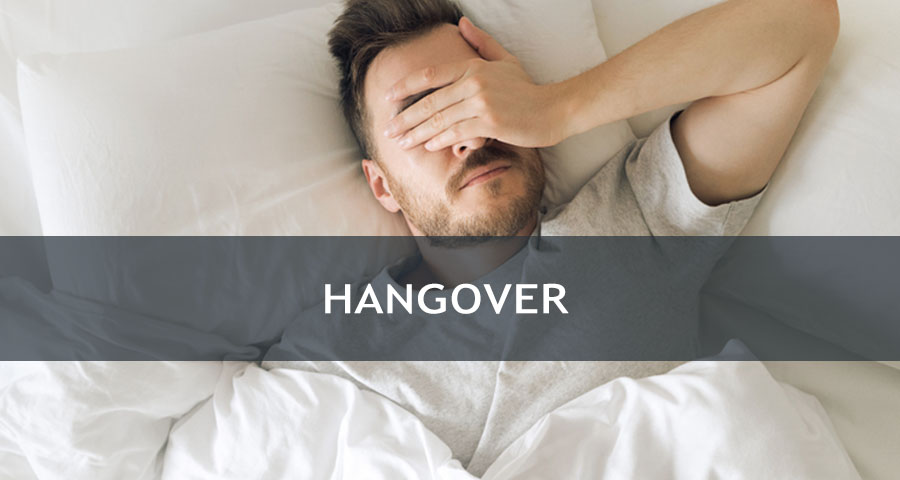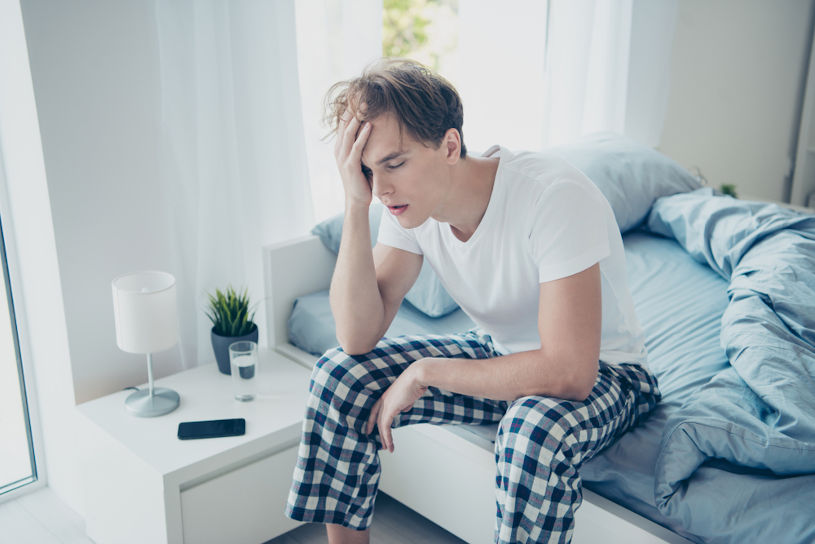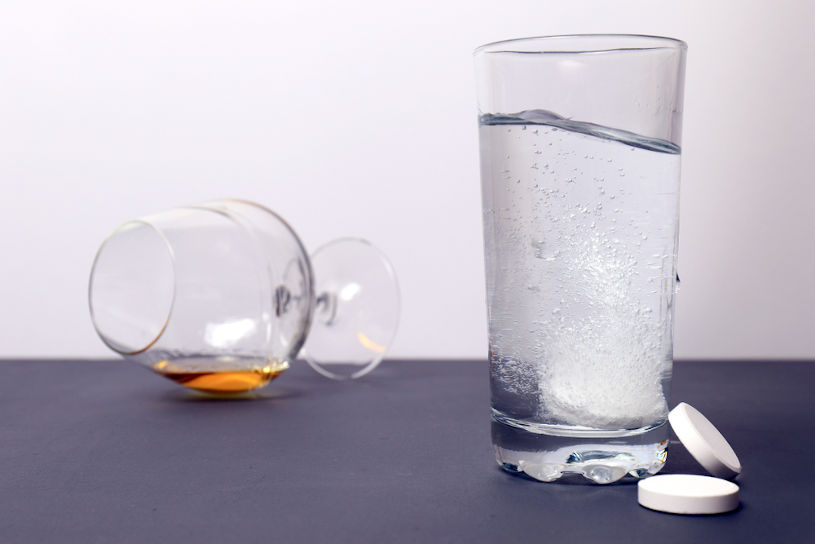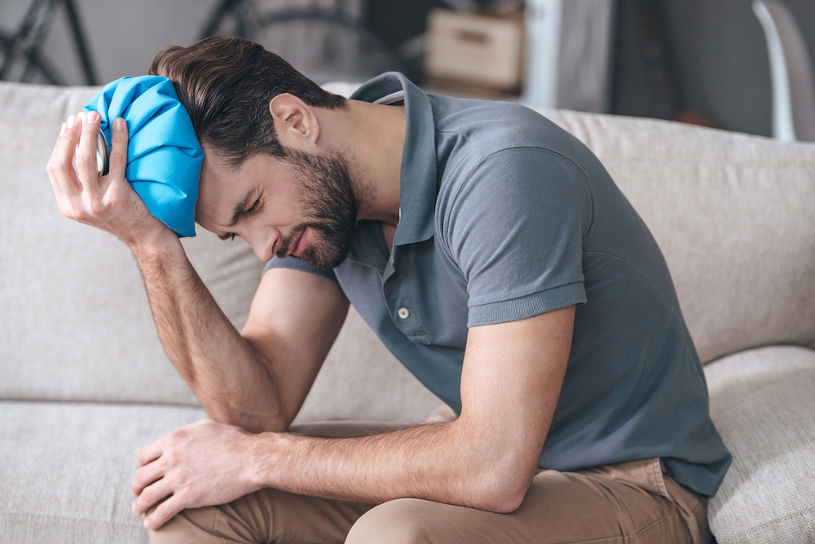
What is a hangover? This condition can be seen on television and in movies. Some alcohol users have experienced hangover symptoms ourselves. That splitting hangover headache, the feeling that one is about to vomit, the sense of seeing everything spun around. Hangovers are awful.
Table Of Contents:
Being under the weather is the imminent result of excessive alcohol drinking, and they are associated with dizziness, vomiting, fatigue, headaches, stomach upset, nausea, palpitations, and other health issues. The mechanism of a hangover is still difficult to explain. Still, it presents itself as an unpleasant psychological and physical condition that is likely caused by several factors such as metabolic acidosis, accumulation of acetaldehyde, disruption in the synthesis of prostaglandins, or the presence of by-products like congeners. The ill-feeling can last for several hours to a whole day and even longer than that. The after-effects may differ from one person to another as the influencing factors include: differences in weight, height, gender, ethnic group, race, alcohol history, drinking amount, and others. Hangover cure is possible just in time for an appointment or an important event. There are quite a few useful techniques that one could use in practicing how to cure a hangover, no matter how serious it may appear.
Let’s take an in-depth look at hangovers and the possible treatment.

Hangover Cure: How To Get Rid of After Effects?
Firstly, is there a hangover cure? If there is, then what is the best one? How does one know which hangover cure is most suited to them? Some said the best way to manage the after-effects is to sleep them off. Getting lots of sleep is certainly helpful, especially as it would help your body relax and improve metabolism. It may not sound like the ultimate hangover cure, but it helps. Symptoms are known to worsen with a lack of sleep. Side effects such as fatigue, headaches, and nausea may be exacerbated. Sleep allows the body to recover from physical and mental stress. The only setback is that sleep does not exclude the negative symptoms of a “morning-after.” Sleep can help the system stabilize, but the common side effect will be felt according to the volume of alcohol used and other factors.
However, One Can Do the Following to Relieve the Symptoms and Be More Comfortable:
Stay Hydrated
Does hydration count as a viable technique on how to cure a hangover? Dehydration triggers many hangover symptoms. Drinking lots of water or some other bland liquid like soda (one that does not stress the digestive system) will help to stay hydrated. Also, drink fruit juice, electrolyte solutions (sports drinks), or bouillon soup. Besides filling up with fluids, these will also replenish the salt and potassium that alcohol makes to lose. A rehydration treatment sachet also helps. A few things you need to understand about alcohol use are that alcohol is a diuretic, which means that urine production is increased exponentially. This forced urine production leads to the loss of electrolytes and fluids from the body. The nauseating feeling from alcohol intoxication causes vomiting, which is another means by which electrolytes and fluids are lost in the body.
Dehydration is only part of what causes a hangover and contributes to increased thirst, dizziness, severe headaches, and fatigue. A good technique that one could adopt to stay hydrated and alleviate the health issues that come with after-effects is to drink reasonable amounts of water while drinking alcohol. This technique may not necessarily hinder dehydration, but it would certainly help curb alcohol intake altogether, making it an effective hangover cure.
Make a Healthy Breakfast
Bland foods like toast and crackers and fruits like bananas and kiwis boost blood sugar levels and relieve symptoms like fatigue and tremors. Reports have shown that alcohol, while causing a hangover, affects blood sugar levels. Another report concluded that glucose and fructose, which can be gotten from food and fruits, effectively inhibited alcohol intoxication symptoms. Bananas and kiwis are good hangover remedies as they additionally provide a potassium boost to the body. But before eating, take an antacid to calm the stomach.
Usually, it is advised to eat lots of food before taking alcohol. Still, if this doesn’t happen and one finds themselves in the middle of a chaotic hangover, simple foods can be taken to boost sugar levels, reduce the adverse effects, or even serve as a hangover cure. These simple foods may include a few slices of wheat bread, toast, a few crackers, and others.
A Reverse-Hangover Breakfast Can Contain One or More of These:
- Eggs – rich in glutathione. Alcohol depletes the body's glutathione storage
- Pickles – for replenishing electrolytes such as sodium
- Nuts – high in magnesium and refills the magnesium content of cells
- Avocado and Banana – helps in increasing potassium levels that have been lost due to drinking
- Oranges – high vitamin C levels which help the body retain its antioxidants such as glutathione
- Salmon - eases the effects by decreasing the formation of inflammation-causing compounds
- Coffee – energizes the body, fights inflammation, and improves physical and mental alertness
- Ginger - highly effective for stopping hangover nausea
Have a Good Sleep
One of the best hangover cure techniques is to sleep it off. Loud noises and bright lights tend to worsen headaches. Rest or go off to sleep again, and then wake up with refreshed feelings. A long relaxing sleep can help facilitate physical and mental recovery from the fatigue built up during activities, and in some cases, a bit of alcohol may facilitate sleep. However, this effect ceases if alcohol is used every day for the same purpose. The resulting health problem is sleep apnea.
Numerous studies have shown that alcoholism is one of the leading causes of sleep disturbance or insomnia. Alcohol, which is a known relaxant, becomes an inhibitor or quality sleep when used excessively. This means that alcohol abuse, leading to frequent hangovers, would alter sleeping habits and make it extremely difficult for one to sleep.
Take an Over-The-Counter Pain Medicine
There is no such thing as hangover remedies for a headache that works for everyone, but an over-the-counter pain medicine will help to manage headaches and muscle pain. What NOT to take for a headache, however, includes aspirin because that irritates the lining of the stomach and magnifies symptoms like nausea and vomiting. NSAIDs such as Naproxen (Aleve) or ibuprofen (Motrin, Advil) are also known to cure hangover headaches.
Avoid acetaminophen (Tylenol) because that can cause damage to the liver. A paracetamol-based remedy works best. However, never take any prescription medications which are not prescribed directly to manage alcohol after-effects.

Hair of The Dog
It may sound counterintuitive, but it is actually advised to drink alcohol as a treatment in order to ease hangover symptoms. This curative technique is called “hair of the dog.” It is a term that is used to symbolize getting a cure from the same element that caused one’s sickness, in essence, using the hair of the dog that had bitten you. The study by Harvard Health Publishing explained, stating that hangovers may be a withdrawal symptom from alcohol, and the brain responds negatively to the absence of this sudden large amount of alcohol with after-effects; this hangover can be cured by drinking more. Is this the best hangover cure? Absolutely not. Medical professionals have advised against using alcohol as a hangover remedy as this perpetuates an unending cycle of drinking.
Take a Walk
The effect of a hangover can limit physical activity. In many cases, those suffering from hangovers usually find themselves in bed for long hours. It is tempting to try to sleep off a hangover. However, physical activities such as taking brisk walks and minor exercises are quite effective against hangovers as they boost detoxification, metabolic processes, and oxygenation, enabling the body to get back to its original state faster. It is undoubtedly an easy hangover cure.
However, the best answer to often-asked questions like “How to get rid of a hangover?” or “How to cure a hangover headache?” is to modify the behavior so that you are less likely to get a hangover in the first place. In the next section, we offer some suggestions for how to do this.
How To Prevent Hangovers?
The most effective way to avoid a hangover is fully understood what causes a hangover or perhaps not to drink at all. Even the best hangover cure is not as effective as prevention. However, if one chooses to drink, keep in mind the following useful tips to avoid the horrendous morning-after:
- Drink to safe limits. How to get rid of a hangover headache? Don’t drink so much. The more the drinks, the greater the chances of having a hangover with intense symptoms. The safe limit is not more than two drinks a day for men and not more than one drink a day for women. Try not to get into “drinking rounds” to make sure one can control how much was drunk.
- Drink, keeping in mind the tolerance level. Tolerance to alcohol differs across individuals. Do not drink more than one can tolerate, or stop immediately when the feeling of intoxication is setting in.
- Don’t drink on an empty stomach. Food in the stomach slows down the absorption of alcohol. It is good to eat fats or carbohydrate-based foods like pasta or rice before one is going to drink.
- Drink slowly. The quicker the user drinks, the more likely they will drink an excessive amount. Drinking rapidly also increases the chance of an overdose that can cause alcohol poisoning.
- Sip water or some other non-alcoholic, non-fizzy beverage in between alcoholic drinks. Sipping something non-alcoholic between glasses keeps one hydrated and ensures not to drink more than the safe limit. However, stick to a non-fizzy or non-carbonated beverage that won’t speed up alcohol absorption by the system.
- Avoid dark-colored drinks. The darker the color of the drink, the higher its congener content. Light-colored or clear beverages like gin, vodka, and white rum are low in congeners. However, remember that both dark-colored liquors and clear drinks will bring on a headache the next day if one drinks too much.
- A good hangover remedy is drinking water before going to sleep. This will keep the body hydrated and prevent many hangover symptoms from occurring. Also, keep a glass of water nearby, so one can drink if woke up at night.
- Stay away from cigarettes. Smoking negatively affects sleep quality, levels of hydration, and the immune system. The effects could worsen hangovers.

What Is A Hangover And What Does It Feel Like?
According to the National Institutes of Health, a hangover is a cluster of unpleasant symptoms that manifest after a person has consumed an excessive amount of alcohol. A hangover is also called “a morning after,” this is because its symptoms are mostly felt in the mornings after a night of partying. That sick feeling that often keeps a person under the sheets for half the day or more is a result of reacting to alcohol toxicity – hangover.
The experience of after-effects may differ from one person to another due to physiological differences, but in general, everyone should feel the following:
- Extreme fatigue
- Muscle aches
- Anxiety
- Sensitivity to light and sounds
- Severe headaches
- Racing heartbeat
- Inability to concentrate
- Nausea
- Sluggishness
- Loss of cognitive functions
- Stomach upsets
- Possible vomiting depending on the severity
- Dehydrated and thirsty
- Restlessness
- Inability to sleep
Hangovers are rampant, especially in the U.S., due to a number of reasons, inclusive of the high availability of alcohol. Hangovers are caused by excessive alcohol use. Research has shown that excessive use of alcohol leads to 95,000 deaths in the United States every year.
How Long Does a Hangover Last?
Usually, hangover symptoms subside on their own within 24 hours if any more alcohol hasn’t been taken. When a person takes an excessive amount of alcohol, their blood alcohol concentration (BAC) is usually considered high. As the alcohol is converted into its toxic metabolites, after-effects become more severe. When BAC drops to the lowest minimum, the hangover hits its peak and begins to drop. Hangovers typically last a couple of hours. Some may last up to 24 hours or more, depending on physiological factors and precautions taken.
What Are The Causes Of A Hangover?
Alcohol can cause dehydration due to its diuretic properties. After drinking liquor, fluid in the body is processed more quickly than usual through urinating and vomiting. This also triggers other symptoms of a hangover, like lightheadedness and increased thirst.
Other Hangover Causes Include:
- Inflammatory responses from the immune system
- Low blood sugar
- Stomach irritation (gastritis)
- Depletion of electrolytes
- Blood vessel expansion (vasodilatation)
- Chemicals produced by alcohol metabolism
- Congeners (compounds used as color and flavor enhancers for liquors)
- Hormonal disruption (serotonin, histamine, and prostaglandins)
- Sleep interference
According to the research, about 75 percent of all who drink an excessive amount of alcohol to the point of being intoxicated experience hangovers.
Causes of Hangover Except Alcohol
What causes a hangover except for alcohol? Other factors may contribute to after-effects apart from alcohol alone. The following factors have also been identified to play a role in hangovers:
The Use of Drugs and Cigarettes
Drugs such as cocaine, marijuana, cigarettes, and other hard drugs may cause a change in the metabolism of alcohol or alter its effects in the brain, thereby escalating the awful feelings in the morning.
Congeners
These are chemical compounds that contribute to the scent, appearance, and taste of the alcoholic drink. Drinks that contain congeners are red wine, whisky, brandy, and some others. These drinks cause stronger hangovers than alcoholic beverages that are purely ethanol, such as vodka.
A History of Alcoholism
Those who come from a family of ardent drinkers would likely experience increased hangovers, unlike individuals with no alcohol background.
Common Hangover Symptoms
Hangover symptoms vary from person to person, but the following are the most common ones:
- Headaches
- Muscle cramps
- Fatigue and weakness even after sleep
- Nausea
- Stomach ache
- Increased thirst and dry mouth
- Dizziness and lightheadedness
- Shakiness and tremors
- Increased sensitivity to light and sound
- Rapid heartbeat
- Anxiety panic attacks
- Decreased cognitive and visual-spatial skills
- Trouble concentrating on the task at hand
Not everybody manifests all of the above symptoms. Which symptoms a person will experience and how intense these symptoms will depend on how many drinks the person had.
Alcohol Works on the Body in the Following Ways to Produce the Classic After-Effect Symptoms:
- Alcohol dehydrates the body as it has diuretic properties. Drinking makes fluids pass out of the body more rapidly. That’s why someone who has drunk too much urinates a lot. This dehydrates the body, and the resulting dehydration triggers many after-effects, like lightheadedness, increased thirst, and dry mouth.
- Alcohol produces inflammatory responses from the immune system. Because EtOH is toxic to the body, over-consumption causes the immune system to react in shock.
- Alcohol reduces blood sugar levels. Low blood sugar levels produce symptoms like shakiness, tremors, fatigue and weakness, mood disturbances, and seizures.
- Alcohol irritates the stomach. Alcohol increases the production of stomach acid that irritates the walls and slows down the excretion process. This can cause stomach pain, nausea, and vomiting.
- Alcohol makes blood vessels expand. This – plus low blood sugar – is often the answer to “What causes a hangover headache?”
- Alcohol metabolism produces chemicals that trigger unpleasant side effects. Acetaldehyde, a metabolite of alcohol processing in the body, provides many of the symptoms.
- Alcohol contains congeners that cause and intensify hangover symptoms. Congeners are chemicals added during the processing and maturation of alcohol to produce color and flavor. They increase the intensity of hangover symptoms.

Risk Factors for Having A Morning After
Although the amount of alcohol consumed determines the intensity of the symptoms, there are other risk factors:
- Drinking more than the body can tolerate: This is a no-brainer. This is why some people get after-effects after having one drink while others, especially chronic users with high tolerance levels, do not get hangovers at all.
- Having low body mass: Muscle and fat tissues absorb alcohol and prevent blood-alcohol levels from rising too rapidly. Those who have low body weight and little body mass get intoxicated more quickly than a thickly-built person. Small men and women usually have more intense hangover symptoms.
- Drinking on an empty stomach: Food in the abdomen prevents blood-alcohol levels from rising sharply.
- Drinking dark-colored liquors: Dark-colored liquors like brandy, whiskey, bourbon, scotch, tequila, red wine, and some beers contain large amounts of congeners.
- Consuming other drugs with alcohol: Consuming alcohol with other drugs such as nicotine increases the severity of hangover symptoms.
- Not getting enough sleep after drinking: Although alcohol makes one sleepy, the quality of sleep a person gets after a night of drinking is poor. Some researchers believe that disturbed sleep can make hangovers more frequent or intensify the symptoms.
- Genetically, one may be more susceptible to hangovers: Yes, there is such a thing as a “hangover gene!” According to a Fox News report, this gene’s presence increases tolerance to alcohol, which means that the person has to drink more to show the effects of alcohol. So, the “hangover gene” does not literally cause hangovers, but the presence of this gene can make one less susceptible to hangovers.
Complications Of A Hangover
Besides feeling terrible and unable to do anything except sit at home, moaning how to get rid of a hangover headache and how to cure hangover nausea, being hungover can affect life in more destructive ways.
For example, the symptoms mentioned above can also give rise to the following complications:
- Absenteeism from work: Severe after-effects may render someone unable to go to work.
- Reduced productivity: Decreased cognitive skills may reduce productivity at work.
- Conflicts with co-workers and/or family members: Mood disturbances can make a person with drinking after-effects less tolerant of people and more prone to arguments. This can lead to conflicts at home or in the workplace.
- Increased risk of injuries: Grogginess, sleepiness, and decreased visual-spatial skills may increase the risk of injuries, especially if one chooses to drive to work, operate heavy machinery, or move around unassisted.
Can A Hangover Be Fatal, Or Does It Just Feel That Way?
Alcohol is toxic to the body. Hangover symptoms show up when the alcohol level in the blood has diminished significantly or is almost nil. So for good reasons, some authorities regard a hangover as the first stage of alcohol withdrawal. The most severe symptoms of after-effects may indicate alcohol poisoning. Alcohol poisoning is a medical emergency and can be fatal.
CALL 911 if a Loved One is Experiencing the Following Symptoms After a Bout of Excessive Drinking:
- Mental confusion
- Seizures
- Slow breathing – less than eight breaths per minute
- Irregular breathing – more than 10 seconds between successive breaths
- Low body temperature
- Bluish or pale skin
- Loss of consciousness
- Persistent vomiting
- Gasping for air
- Hypothermia
- Erratic breathing
Generally, after-effects do not lead to a trip to the E.R., but the symptoms are very unpleasant and may be inconvenient at times. Almost the definition of a hangover is that it’s a reminder that alcohol in excess amounts is bad for us. One can still enjoy the glass of red wine or an occasional beer but stay within safe limits. After-effects are preventable if one drinks safely and mindfully.
Hope Without Commitment
Find the best treatment options. Call our free and confidential helpline
Most private insurances accepted
Find Drug Rehabilitation Centers Near You Anywhere In the US
Addiction Resource team has compiled an extensive list of the top drug rehabilitation facilities around the country. Use our locator tool to find the best centers near you.
Page Sources
- Mackus M, van Schrojenstein Lantman M, Van de Loo AJAE, Kraneveld AD, Garssen J, Brookhuis KA, Verster JC. Alcohol metabolism in hangover sensitive versus hangover resistant social drinkers. Drug Alcohol Depend. 2018 https://pubmed.ncbi.nlm.nih.gov/29500954/
- Van de Loo AJAE, van Schrojenstein Lantman M, Mackus M, Scholey A, Verster JC. Impact of mental resilience and perceived immune functioning on the severity of alcohol hangover. BMC Res Notes. 2018. https://www.ncbi.nlm.nih.gov/pmc/articles/PMC6069540/
- Courtney KE, Worley M, Castro N, Tapert S.F. The effects of alcohol hangover on future drinking behavior and the development of alcohol problems. Addict Behav. 2018 https://www.ncbi.nlm.nih.gov/pmc/articles/PMC5783770/
- R Swift, D Davidson. Alcohol hangover: mechanisms and mediators. 1998. https://pubmed.ncbi.nlm.nih.gov/15706734/
- R H Ylikahri, T Leino, M O Huttunen, Ar Posso, C J Eriksson, Nikkila. Effects of fructose and glucose on ethanol-induced metabolic changes and on the intensity of alcohol intoxication and hangover. 1976. https://pubmed.ncbi.nlm.nih.gov/1253812/
- Michael D. Stein, Peter D. Friedmann, Disturbed sleep and its relationship to alcohol. 2009. https://www.ncbi.nlm.nih.gov/pmc/articles/PMC2775419/
- Soon-Yeob Park, Mi-Kyeong Oh, Bum-Soon Lee, Haa-Gyoung Kim, Won-Joon Lee, Ji-Ho Lee, Jun-Tae Lim, Jin-Young Kim. The effects of alcohol on quality sleep. 2015. https://www.ncbi.nlm.nih.gov/pmc/articles/PMC4666864/
- Joris C. Verster, Richard Stephens, Renske Penning, Damaris Rohsenow, John McGeary, Dan Levy, Adele McKinney, Frances Finnigan, Thomas M. Piasecki, Ana Adan, G. David Batty, Lies A.L. Fliervoet, Thomas Heffernan, Jonathan Howland, Dai-Jin Kim, L. Darren Kruisselbrink, Jonathan Ling, Neil McGregor, René J.L. Murphy, Merel van Nuland, Marieke Oudelaar, Andrew Parkes, Gemma Prat, Nick Reed, Wendy S. Slutske, Gordon Smith, Mark Young. The alcohol hangover research group consensus statement on best practice in alcohol hangover research. 2013. https://www.ncbi.nlm.nih.gov/pmc/articles/PMC3827719/
- National Institute on Alcohol Abuse and Alcoholism. Hangovers. https://www.niaaa.nih.gov/publications/brochures-and-fact-sheets/hangovers
- Robert Swift, Dena Davidson. Alcohol Hangover: Mechanism and mediators. 1998. https://www.ncbi.nlm.nih.gov/pmc/articles/PMC6761819/
- U.S. National Library of Medicine. Hangover treatment. https://medlineplus.gov/ency/article/002041.htm
- Health Direct. Hangover 'cures' https://www.healthdirect.gov.au/hangover-cures
- Harvard Health Publishing. 7 steps to cure hangover. 2020. https://www.health.harvard.edu/staying-healthy/7-steps-to-cure-your-hangover-and-ginkgo-biloba-whats-the-verdict
- Centers for Disease Control and Prevention. Excessive Drinking is Draining the U.S. Economy. https://www.cdc.gov/alcohol/features/excessive-drinking.html
- Sant P. Singh. Why do hangovers occur? 2003. https://www.scientificamerican.com/article/why-do-hangovers-occur/


 Reviewed by:
Reviewed by:  Written by:
Written by: 

 FindTreatment.gov
FindTreatment.gov